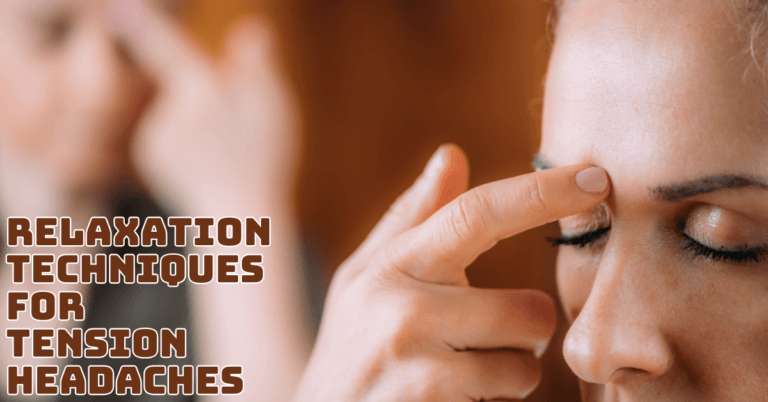Best Ways To Reduce Stress Headaches Naturally
Best Ways To Reduce Stress Headaches Naturally
Stress headaches can be common and debilitating problems for many people. Whether brought on by problems at work, in the family, or personally, stress can result in tension headaches that can affect daily living.
Numerous headache treatments are on the market. Managing stress headaches naturally is an excellent option.
This blog post will explore some of the best natural remedies for stress headaches, including lifestyle changes, relaxation techniques, and home remedies that you can try to alleviate your headache symptoms without relying on medication.

What Are Stress Headaches?
Stress headaches, also known as tension headaches, are a common type of headache many people experience.
Stress or strain in the neck and head muscles is a common cause of these headaches, which can be painful and uncomfortable.
A dull, aching pain with a tightening sensation around the head commonly describes a stress headache.
Stress headaches can also cause tenderness or sensitivity in the scalp, neck, and shoulders.
Stress, worry, and sadness are frequently factors in stress headaches, while the etiology is not entirely understood.
Stress tightens our body muscles, particularly those in the neck and head. This tension may result in mild to severe headaches.
Stress headaches can also be triggered by other factors such as poor posture, eye strain, lack of sleep, dehydration, and poor diet.
Certain foods, such as those high in caffeine, sugar, and artificial sweeteners, have also been known to trigger stress headaches in some people.

Ways To Reduce Stress Headaches Naturally
Stress headaches are common headaches caused by stress, tension, and anxiety. They can be quite debilitating and can affect your quality of life. Thankfully, there are a lot of natural solutions to lessen stress headaches.

1. Exercise Regularly
Exercise has numerous benefits for overall health and well-being, including reducing the frequency and intensity of stress headaches.
When we exercise, our body releases endorphins, neurotransmitters acting as natural painkillers. These endorphins can help reduce the pain's power associated with stress headaches.
Regular exercise can also help to reduce stress and tension in the body, which are common triggers for stress headaches.
When stressed, our muscles tend to tense up, which can cause headaches. Exercise can help to relax these muscles, reducing tension and alleviating headaches.
Exercise can improve blood flow and circulation, which can also help to reduce headaches. When we exercise, our heart rate increases, which can improve blood flow to the brain and other parts of the body.
This improved circulation can help to reduce the frequency and intensity of headaches.

2. Yoga And Meditation
Yoga and meditation are ancient practices that have been used for thousands of years to promote physical and mental well-being. While they are often practiced together, they are distinct practices that offer unique benefits.
Yoga involves a series of physical postures, breathing techniques, and meditation. The poses are designed to stretch and strengthen the body, while the breathing techniques help to calm the mind and reduce stress.
Through regular practice, yoga can improve flexibility, balance, strength, and overall physical health.
On the other hand, meditation is a mental practice that involves training the mind to focus and be present at the moment. Meditation can take many forms, including mindfulness, loving-kindness, and visualization.
Regular meditation practice teaches one to cultivate a sense of inner calm, reduce stress and anxiety, and improve overall mental well-being.
Together, yoga and meditation can be powerful tools for reducing stress and tension in the body.
Stress is a common cause of tension headaches, and by reducing stress through these practices, one may experience fewer and less intense headaches.
Additionally, both yoga and meditation can improve sleep quality, which is also important for reducing stress and tension in the body.

3. Acupuncture Treatment
Acupuncture is a complementary medical practice rooted in Traditional Chinese Medicine (TCM).
It is based on the concept that the body has a network of meridians, or channels, that carry energy, known as Qi (pronounced “chee”), throughout the body.
According to TCM, illness and pain occur when Qi is blocked or not flowing properly.
Acupuncture involves the insertion of fine, sterile needles into specific points on the body, known as acupoints, to stimulate the flow of Qi and restore balance to the body.
The needles are left in place for 20 to 40 minutes, during which time the patient may feel a mild tingling or numbness or a sensation of heaviness or warmth.
In Western medicine, acupuncture stimulates the body's natural healing mechanisms, such as releasing endorphins (natural painkillers) and activating the immune system. It treats various conditions, including chronic pain, migraines, and anxiety.
One of the most common applications of acupuncture is treating headaches. Acupuncture effectively reduces the frequency and intensity of tension headaches, migraines, and other headaches by reducing muscle tension, promoting relaxation, and improving circulation to the head and neck.

4. Heat And Cold Therapy
Heat and cold therapy are common methods to alleviate pain and discomfort associated with stress headaches.
These therapies work by changing the temperature of the affected area, which can help reduce muscle tension and inflammation and relieve pain.
Heat therapy involves applying warmth to the affected area. You can achieve it through a warm compress, hot water bottle, or heating pad. Heat therapy can also increase flexibility and range of motion in the affected area.
Cold therapy involves applying cold to the affected area through a cold compress, ice pack, or frozen vegetables. Cold treatment is particularly effective for reducing pain and swelling associated with injuries.
When using heat or cold therapy for stress headaches, it's important to exercise caution and avoid applying extreme temperatures.
Heat should be warm but not hot enough to burn the skin. Similarly, cold should be cold but not freezing sufficient to damage the skin.

5. Adequate Sleep
Sleeping is crucial for maintaining overall health and well-being. Sleep also significantly reduces stress and tension, which can contribute to headaches.
Lack of sleep can also weaken the immune system and affect cognitive function, leading to increased irritability and mood swings.
Sleep helps the body repair and rejuvenate itself, allowing for physical and mental restoration. It helps regulate the body's circadian rhythm, maintaining its internal clock and regulating sleep-wake cycles.
The body's natural rhythms can become disrupted without adequate sleep, increasing stress and tension.
Chronic sleep deprivation is linked to various health issues, including cardiovascular disease, obesity, and diabetes.
It can also affect memory, learning, and decision-making abilities, making concentrating and performing everyday tasks difficult.

6. Healthy Diet
Eating a healthy and balanced diet is essential for maintaining good health, reducing the risk of chronic diseases, and managing stress headaches.
When you eat a balanced diet, your body receives the nutrients to function optimally, positively impacting your mood and stress levels.
Processed foods, high in salt, sugar, and unhealthy fats, can trigger inflammation, leading to headaches and other health problems.
Conversely, a diet rich in fruits, vegetables, and whole grains can help reduce inflammation and promote overall health.
Fruits and vegetables contain vitamins, minerals, and antioxidants that can help boost your immune system, protect your cells from damage, and reduce inflammation.
They are also low in calories and fibre, which can help you maintain a healthy weight and prevent chronic diseases like diabetes and heart disease.

7. Stay Hydrated
Hydration is essential for maintaining optimal bodily function and overall health. Dehydration in the body can cause various symptoms, including headaches.
This is because dehydration can reduce blood volume and blood flow to the brain, triggering headaches.
Stress headaches, also known as tension headaches, are a common type of headache that various factors, including stress, anxiety, poor posture, and muscle tension, can cause.
Staying hydrated throughout the day can help reduce the severity and frequency of stress headaches by ensuring the body has enough fluids to support proper blood flow and oxygen delivery to the brain.
To stay hydrated throughout the day, it's recommended to drink water or other fluids regularly and to monitor urine colour as a general indicator of hydration status.
Clear or light-coloured urine usually indicates adequate hydration, while dark-coloured urine may indicate dehydration.

8. Massage Therapy
Massage has been an ancient practice for centuries to promote relaxation, reduce stress, and ease pain.
Today, massage therapy is a popular form of complementary and alternative medicine used to treat various physical and mental health conditions.
Massaging the neck, shoulders, and scalp can be particularly effective in reducing tension and stress headaches.
The muscles in these areas can become tight and painful due to stress, poor posture, or repetitive strain. Massage can help to relieve this tension, increase circulation, and promote relaxation.
Many massage techniques are used to treat tension and stress headaches. Some of the most common include Swedish massage, deep tissue massage, trigger point therapy, and myofascial release.
Each technique targets different layers of muscle and connective tissue and can be adjusted to meet the needs of each individual.

9. Breathing Exercises
Breathing exercises are powerful tools for managing stress and promoting relaxation. Taking slow, deep breaths activates the parasympathetic nervous system, responsible for the body's “rest and digest” response.
The body's “fight or flight” reaction to stress is mediated by the sympathetic nervous system, which can be counteracted by doing this.
One simple breathing exercise is called “belly breathing” or “diaphragmatic breathing.” To do this exercise, sit or lie comfortably and place one hand on your belly and the other on your chest.
Breathe slowly through your nose, feeling your belly rise as you inhale. Hold your breath for a few seconds, then exhale slowly through your mouth, feeling your stomach fall as you exhale.
Repeat this for several minutes, focusing on the sensation of your breath moving in and out of your body.
Another breathing exercise is counted breathing. To do this exercise, inhale slowly through your nose to the count of four, then hold your breath for a count of four.
Exhale slowly through your mouth to the count of four, then hold your breath for a count of four. Repeat this cycle for several minutes, focusing on rhythm.

10. Time Management
Time management refers to effectively planning and allocating time to complete tasks and achieve goals. Poor time management skills can lead to stress and tension, ultimately resulting in headaches.
Stress headaches are a common type of headache that can range from mild to severe and are typically caused by anxiety and stress.
When you have poor time management skills, you may feel overwhelmed by the number of tasks you need to complete and may need help prioritizing them.
This can lead to procrastination, missed deadlines, and increased stress levels. The more stressed you become, the more likely you are to experience headaches.
You must analyze how you spend your time to improve your time management skills. This will help you identify areas where you waste time or could be more productive.
Once you have recognized these areas, you can create a schedule that prioritizes your tasks and lets you focus on the most important ones first.

11. Essential Oils
Essential oils can be a natural and effective way to relieve headaches. Lavender and peppermint oils, in particular, are known for their calming and pain-relieving properties.
Lavender oil has a calming effect on the nervous system, which can help reduce tension and anxiety, which can contribute to headaches.
One way to use lavender oil is to inhale it directly by adding a few drops to a tissue or cotton ball and holding it near the nose and mouth. Another way is to dilute it in a carrier oil and massage it onto the temples, forehead, and neck.
Peppermint oil cools the skin and can help reduce inflammation and pain. It is frequently used to treat migraines and tension headaches.
To use peppermint oil, either dilute it in a carrier oil and apply it to the temples, forehead, and neck, or put a few drops to a tissue or diffuser for direct inhalation.
Before using any new essential oils, testing a small skin patch for potential adverse reactions is usually a good idea.

12. Limit Caffeine Intake
Caffeine is a central nervous system stimulant that can increase alertness, improve mood, and decrease fatigue.
However, consuming too much caffeine can negatively affect the body, exacerbating stress headaches.
When you have a stress headache, your neck and scalp muscles can become tense, leading to pain and discomfort. Caffeine can worsen this tension by increasing the level of stress hormones in the body.
You can always reduce your consumption of coffee, tea, soda, and other caffeinated beverages to limit your caffeine intake and prevent withdrawal headaches.
Doing this slowly is essential to avoid abrupt changes that could cause withdrawal symptoms like headaches, fatigue, and irritability.

13. Take Breaks
Taking breaks throughout the day can be essential for maintaining your productivity and reducing stress levels.
Working for extended periods without taking breaks can cause physical and mental strain, leading to headaches, muscle tension, and fatigue.
Regular breaks can reduce stress and tension and give your mind and body a chance to rest and recharge.
There are several ways to take breaks during the day, such as taking a short walk, doing some stretches, or practicing a quick meditation or deep breathing exercises.
These activities can help to relax your mind and body and release any physical or mental tension that may be contributing to stress headaches.
Studies have shown that breaks can improve mental clarity, boost creativity, and increase productivity.
In addition to reducing stress and tension, regular intervals can help prevent burnout and reduce the risk of developing chronic health issues associated with stress.

14. Avoid Overthinking
Overthinking is when a person excessively analyzes and dwells on their thoughts and concerns, often leading to negative outcomes such as anxiety, stress, and tension.
Overthinking can harm a person's mental and physical health, leading to increased pressure and physical symptoms such as headaches and fatigue.
One way to identify when you're overthinking is to notice your thought patterns. If you constantly worry about the same things or replay past events in your mind, this may be a sign that you are overthinking.
Additionally, if you spend excessive time analyzing every detail of a situation or decision, this may also indicate overthinking.
Finding ways to distract yourself and shift your focus to something more positive is important to combat overthinking and reduce stress levels.
This may include engaging in physical exercise or activities, spending time with loved ones, practicing mindfulness or meditation, or engaging in creative pursuits such as writing or art.

Conclusion
There are several natural ways to reduce stress headaches naturally. These can include practicing relaxation techniques such as
- Deep breathing or meditation
- Regular exercise
- Improving sleep habits
- Maintaining a healthy diet
- Staying hydrated
- Managing stress through yoga or therapy
Listening to your body and taking steps to prevent and manage stress headaches before they become chronic is essential.
I trust you enjoyed this article about the Best Ways To Reduce Stress Headaches Naturally. Please stay tuned for more blog posts soon.
JeannetteZ
>>>Please click here to read my all-inclusive article about Lessons That Will Teach You All About Stress<<<
>>>Are you interested in Natural Healing And Stress Relief through Herbs? Please click here for my #1 Recommendation<<<
Your Opinion Is Important To Me
Do you have thoughts, ideas, or questions? I would love to hear from you. Please leave me your questions, experiences, and remarks about this article on the Best Ways To Reduce Stress Headaches Naturally in the comments section below. You can also reach me by email at Jeannette@Close-To-Nature.org.
Disclosure
This post may contain affiliate links. I earn from qualifying purchases as an Amazon Associate and other affiliate programs. Please read my full affiliate disclosure.
You might also enjoy these blog posts:
Top Tips To Reduce Stress For Your Horse
Causes And Effects Of Stress In Horses








